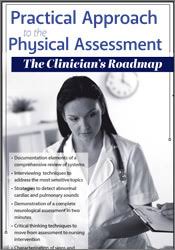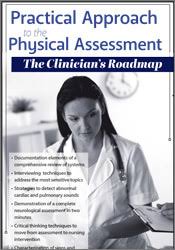Rachel Cartwright-Vanzant – Practical Approach to the Physical Assessment
$219.00 Original price was: $219.00.$61.75Current price is: $61.75.
Available for Pre-Order. This product will be available within a few days.
Rachel Cartwright-Vanzant – Practical Approach to the Physical Assessment
Description:
- Documentation elements of a comprehensive review of systems
- Interviewing techniques to address the most sensitive topics
- Strategies to detect abnormal cardiac and pulmonary sounds
- Demonstration of a complete neurological assessment in two minutes
- Critical thinking techniques to move from assessment to nursing intervention
- Characterization of signs and symptoms with disease states
You have been assigned your patients for the shift. One of your patients is particularly complex. You have a gut feeling about this patient, which usually means something is not quite right…. Your time is divided amongst all your assigned patients because they require you attention too. How do I perform an accurate, thorough, and timely assessment when I have such little time, and then, how do I chart all the care I performed?
Time is a commodity healthcare providers are not afforded in today’s reality. We must learn to perform our job with excellence, precision and with efficiency. It can be done but we must work at it. One way is to be certain of your assessment skills and what to look for so you can quickly establish your priorities. No Rapid Responses on my shift if I can help it!
Whether you are a novice or expert, have been in practice for a few years or decades, it is possible that you may not have heard or seen enough examples of abnormal symptom and assessment findings. Attend this information-packed seminar and learn the latest research findings, evidence-based practice guidelines and techniques, including assessment tools for evaluation and treatment that you can implement into your practice immediately. Enhance your current interviewing and examination techniques, critical thinking skills, and learn new fun mnemonics to aid in the recall of many clinical conditions. Your speaker, Rachel Cartwright-Vanzant, MS, RN, CNS, LHRM, LNCC, will present topics using a variety of methods, including sample charting, discussion of differential symptom analysis and clinical case studies.
OUTLINE
INTERVIEWING, HISTORY-TAKING AND DOCUMENTATION TECHNIQUES
Communication Skills and Interview Strategies
- Communications strategies for sensitive topics
- Mental health issues
- Drug/alcohol issues
- Sexuality issues
- Other sensitive issues
- General literacy & health literacy
Core Adult History and Physical Exam Skills
- Accountability for obtaining baseline data
- Recording the assessment
- Reporting relevant data
- Past medical history
- Chief complaint
- Analysis of a symptom
- Remember “OPQRST”
- Elements of a history
- Problem focused
- Detailed
- Comprehensive
Physical Exam Techniques
- Inspection
- Palpation
- Percussion
- Auscultation
Critical Thinking Skills
- Assessment
- Nursing diagnosis
- Planning & outcome identification
- Implementation
- Evaluation
Documenting the Physical Exam
- Electronic medical records
- Strategies to overcome the dangers of
- Charting by Exception
- Legal implications & nursing standards
ASSESSMENT STRATEGIES FOR CHALLENGING SYMPTOMS
Integumentary System
- Legal issues surrounding the skin
- Assessment and common abnormalities
- Anatomy of the skin
- Pressure sore staging/grading
- National Pressure Ulcer Advisory Panel
Head and Neck
- Assessment and common abnormalities
- Abnormal facial features
Thorax and Lungs
- Assessment and common abnormalities
- Respiratory landmarks
- Oxygen transport and delivery
- Abnormal breath sounds
- Acute respiratory failure
- Pulmonary embolism
- ABG interpretation
Cardiac and Vascular Systems
- Assessment and common abnormalities
- Cardiac landmarks
- Basic EKG analysis
- Abnormal heart sounds
Abdomen
- Assessment and common abnormalities
- Abdominal landmarks
Musculoskeletal System
- Assessment and common abnormalities
- Grading muscle tone and strength
- Osteoarthritis vs autoimmune
Nervous System
- Assessment and common abnormalities
- Autonomic nervous system
- Parasympathetic nervous system
- Sympathetic nervous system
- Interactive cranial nerves
- Normal findings
- Abnormal significance
- Head injury
- “Nature of the injury”
- Concussion
- Increasing intracranial pressure
Would you like to receive Rachel Cartwright-Vanzant – Practical Approach to the Physical Assessment ?
Case Studies
OBJECTIVES
- List eight system elements included in a review of systems.
- Identify three strategies to assess patients for low health literacy.
- Revise documented entries applying the “FACT” rule.
- Interpret arterial blood gases in a flash.
- Name three signs and symptoms of inadequate oxygenation.
- Identify the waveforms of a normal EKG pattern.
- Discuss possible etiology and significance of common cardiovascular assessment abnormalities.
- Identify structures in regions of the abdomen.
- Discuss abdominal assessment findings that warrant emergent intervention intestinal obstructions.
- Incorporate the cranial nerves assessment, Glasgow coma scale, and reflex grading scale to the neurologic exam.
Course Features
Lectures
0
Quizzes
0
Duration
Lifetime access
Skill level
All levels
Students
0
Assessments
Yes
Be the first to review “Rachel Cartwright-Vanzant – Practical Approach to the Physical Assessment” Cancel reply
Related products
Health & Medical
N. Bradley Keele – Psychopharmacology Update – Medications, the Brain, and Behavior
Health & Medical
Health & Medical
Health & Medical
Kate Freeman – Heart Of Releasing – Masters for Daily Releasing













Reviews
There are no reviews yet.